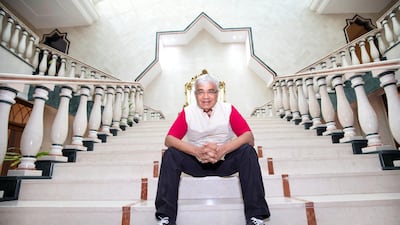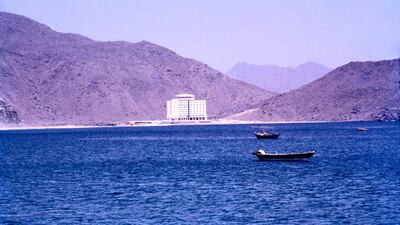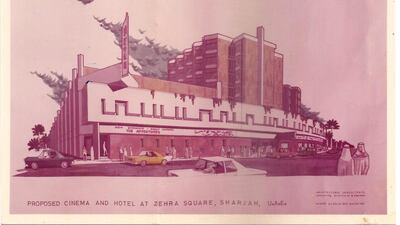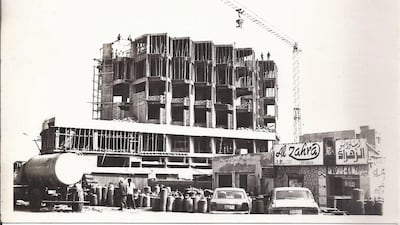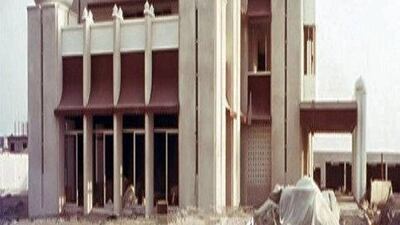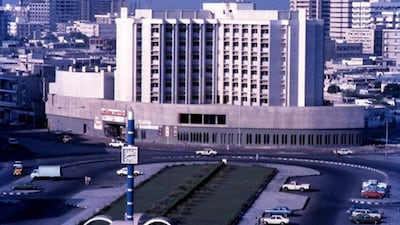A group of about 80 people packed into the majlis of one of the vast family residences in central Sharjah last weekend for a conversation between the house's architect – Ashok Mody – and one of the children who grew up in it, Sultan Sooud Al Qassemi.
"I was very happy to be there," says Mody, who lived in Sharjah from 1975 to 1980 and is responsible for a number of buildings in the emirate, such as Al Zahra Hospital, the Dibba housing project, villas in Al Ghubaiba, and the Oceanic Hotel in Khorfakkan.
"At the time there was a construction boom," Mody says. "People from all over the world were pouring into the Middle East."
His reminiscences sketch a smaller, yet still lively city. There was no traffic then between Dubai and Sharjah, and Mody says he used to buy his bread each day in Dubai. He went there in a shared taxi for which he paid one dirham. But traffic, that scourge of Sharjah, still features in his memories: Mody says queues used to form behind police cars. "Traffic police were the only point of contact with government in our day-to-day life," he says. "We were always worried of being caught for speeding. If we saw the car of a traffic police in front of our car, we would never dare to overtake."
He says passing the driving test was difficult, and his wife resorted to "emotional blackmail" to succeed – she showed up for her test at seven months pregnant. "The strategy worked. She passed at the first attempt."
'I was honoured by his passion'
Mody was in Sharjah at the invitation of Al Qassemi, who is researching architecture in the emirate, and had contacted the architect after studying the history of his buildings. "Actually, he got the wrong name," Mody says. "Instead of Ashok Mody he had Ashok Mehta [another Indian architect], and he could not find me."
When Al Qassemi was corrected, Mody says: "He called me on a Wednesday and said, 'I want to come and meet you on Friday'. I said, 'Are you in Mumbai?' He said, 'No, I'm not in Mumbai, but I'm coming to meet you.' He came straight from the airport to my office, we had a chat for hours, and he left in the evening. I was honoured by his passion."
Mody's most important commission is Al Zahra Hospital of 1975. One of the major hospitals in the city, it sits regally with two balanced wings, perched upon the curve of ground-floor premises. Mody revealed during the talk that it was originally a hotel, but its purpose was changed midway through construction, and the rooms destined for hotel guests took in patients, instead.
Developing a new system
As an architect for key municipal projects, Mody was privy to the mix of ambition and social responsibility that permeated that era. A housing project in Al Ghubaiba, for example, answered the need of Dr Sheikh Sultan Al Qasimi’s plans for education in the emirate.
________________________
Read more:
Architecture tells us about our history and ourselves
From brutal to beautiful, new book series charts remarkable architecture of the UAE
Sultan Al Qassemi settles lawsuit with Sotheby's
________________________
“The Ruler of Sharjah wanted to make Sharjah an international hub,” Mody tells me, “so he started the construction of schools, colleges, other institutes, which would need lots of teachers – so he wanted to make houses to accommodate those teachers. He told us that he wanted 1,000 houses in one year. Because then by that time the school would be complete and the houses should also be complete.
“But it was impossible to construct 1,000 houses with conventional construction types.”
Mody developed a system by which a unit consisting of a floor and two walls would be placed, then the builders would add the two other walls. With this technique, they completed the thousand-house goal.
'Grand living with some Islamic features'
Mody's personal favourite project is the Oceanic Hotel – a perfect exemplar of Gulf architecture of the 1970s, with its slightly futuristic discus levitating upon the two modernist wings. At the heart of the building is an elevator that offers passengers views over the sea. "Right now you might find an observation elevator in many places," he says. "But in 1977 there were not any. We were the first to introduce a viewing elevator in this part of the world."
According to Mody, when it came to designing the Sooud Al Qassemi house, the senior Al Qassemi gave him “a very small brief: I want to have a grand living with some Islamic features”.
"Coming back, I can see that it's still a grand living. In this one room there were about 80 people there and it wasn't crowded at all," says the architect, diligently pointing out how he fulfilled his client's brief. "We created a grand staircase. And we brought some onion-shaped domes."
One might also add to this: grand ambitions. The Al Qassemi family is leaving the premises, but the fate of the building is not clear. "Sultan wants to convert the house into an art gallery. It would be really good if this building, which we have designed like a grand palace, becomes an art gallery. It would be a wonderful transformation."
So, Mody might have one more notable commission left to complete.
